How AI Will Drive Disruptive Change in Businesses
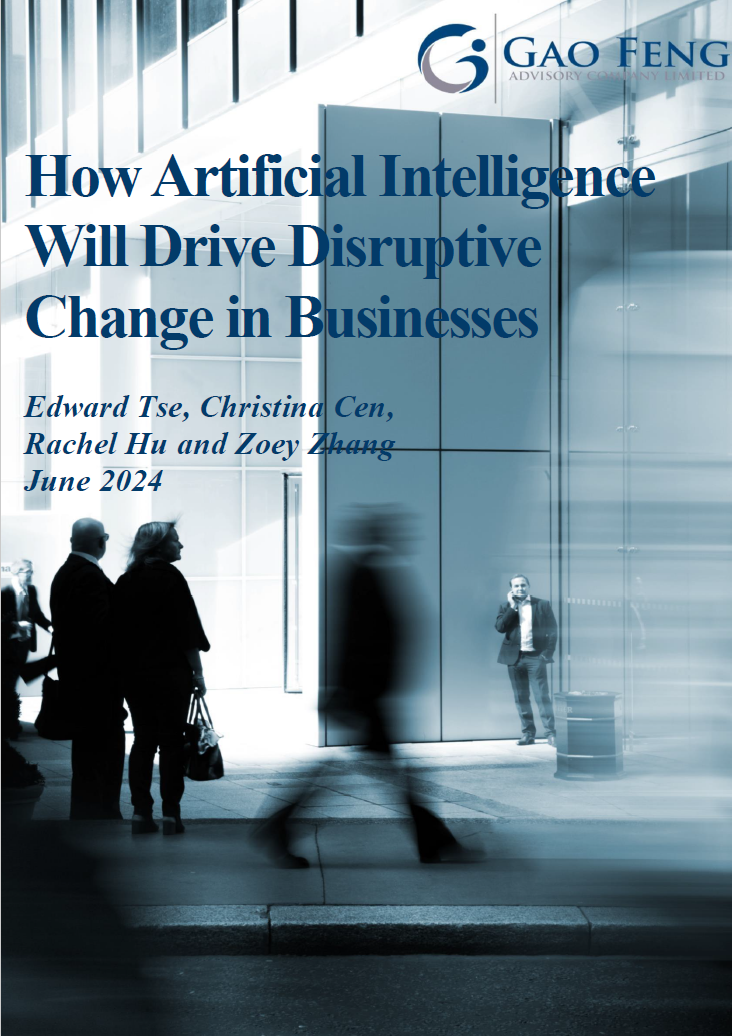
Artificial intelligence (AI) has become a key driver of business innovation and disruption in this rapidly evolving era. This article explores how AI technology, particularly generative AI or AI-generated content (AIGC), is reshaping the global business landscape and how companies can leverage this powerful tool to shape the future. By analyzing examples of AIGC applications across various industries—from retail to automotive manufacturing, from education to supply chain management—this article illustrates how AIGC helps businesses optimize operations, enhance customer experiences, and innovate new business models.
The article not only discusses the technological advancements and commercial applications of AIGC but also highlights the challenges and opportunities these transformations bring to ethics, policymaking, and society as a whole. As AIGC technology becomes more widespread, global enterprises must recognize that embracing AIGC is not merely a means to enhance efficiency but a crucial step towards achieving sustainable development and maintaining competitiveness.
With rapid technological advancements, AIGC has become a vital domain, utilizing advanced algorithms to automatically create content such as text, images, audio, and video. Particularly in China, this technology has been widely applied across various business sectors, including retail, manufacturing, new energy vehicles (NEVs), healthcare, education, and tourism. Looking ahead, the application prospects for AIGC will be even broader, potentially covering more intelligent robotic assistants and providing more personalized user experiences.
Entering the Era of Generative AI
We are entering a new era of AIGC, where this technology is becoming a key force driving enterprise transformation and upgrading. With continuous AI advancements and enhanced data processing capabilities, businesses can utilize these tools to optimize decision-making processes, improve operational efficiency, and innovate products and services. As competition in the AI industry intensifies between China and the US, numerous innovative companies such as OpenAI, Alibaba, Baidu, and SenseTime continually push the boundaries of AI technology. These companies, through relentless technological innovation, have evolved from machine learning (narrow AI) to machine perception (general AI) and are gradually advancing towards machine cognition (super AI). It is anticipated that in this stage, AI will be capable of advanced cognitive learning, surpassing human abilities and providing more efficient problem-solving and decision-making capabilities. Although we have yet to enter the third stage fully, the rapid development of AIGC shows great potential for reaching higher levels of intelligence.
AIGC offers unique benefits to various industries by significantly enhancing customer experience and engagement through automated content creation. It also enables real-time analysis of large datasets, quickly identifying market dynamics and consumer behavior changes, helping businesses swiftly adjust strategies to stay competitive. This data-driven decision-making process significantly reduces decision costs, enhancing a company's competitiveness and market responsiveness. Additionally, the application of AIGC promotes continuous improvement and iterative innovation. Businesses can learn from user feedback and behavior data, continuously optimizing products and services, thereby maintaining a leading position in a constantly changing market environment.
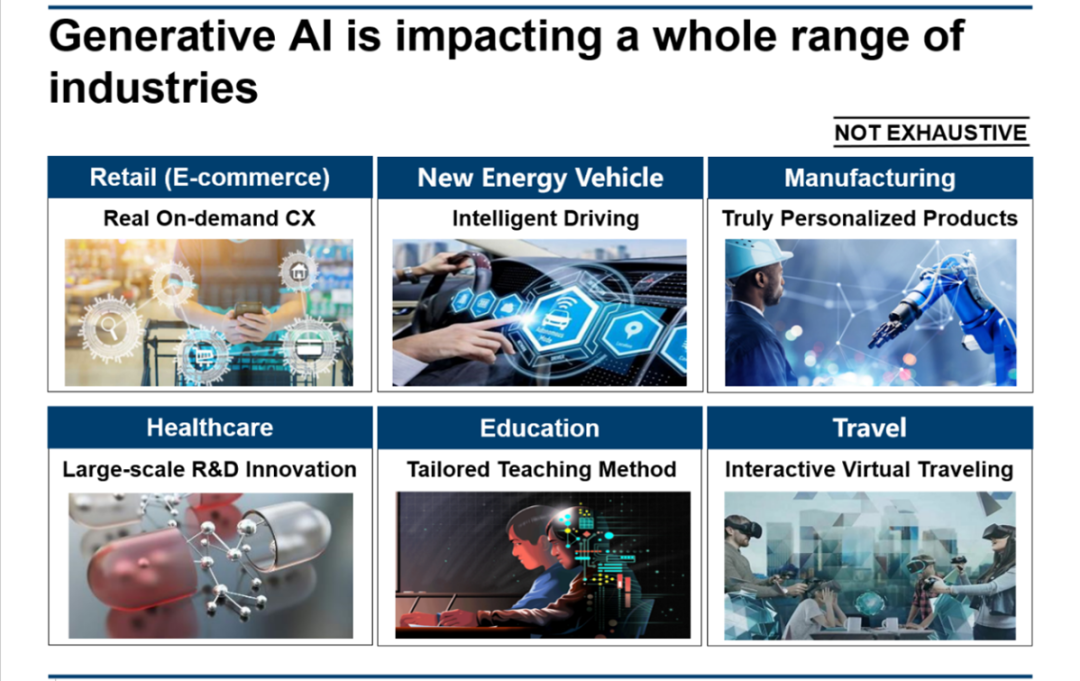
Source: Gao Feng Analysis
Generative AI Disrupting Business Models
AIGC is profoundly reshaping business operations and strategies by redefining customer relationships and innovating business models. AI enables companies to build new capabilities and undergo organizational transformation. It facilitates the reconstruction of ecosystems and value chains, enhancing a company's agility in responding to market changes and achieving real-time interaction, thereby driving innovation and personalized marketing. Through these transformations, generative AI increases the efficiency and competitiveness of customer-centric business models. Simultaneously, AIGC is altering the traditional roles of manufacturers, intermediaries, and customers. In the future, customers will be able to directly participate in the creation or standardization of products and services, while manufacturers will handle customer orders directly through AIGC, significantly reducing the role of intermediaries. This fundamental role change not only alters the cost structure of intermediaries but also introduces new market participants—generative AI practitioners—bringing new changes and opportunities to the traditional ecosystem.
In the education sector, AI is transforming learning by enhancing various educational processes—from smart classrooms and educational robots to intelligent grading and tutoring. AI improves teaching efficiency, boosts student engagement, and enhances home education interactions. By leveraging educational data throughout the learning journey, AI helps develop student habits and simplifies management for teachers, enriching resources and allowing them to focus more on teaching and student interaction. For parents, AI offers affordable, 24/7 home teaching support, optimizing interactions by analyzing children's emotional and competency skills, thereby improving parent-child relationships.
AI is revolutionizing the consumer goods and retail industry by fundamentally changing how the market operates. By enhancing deep insights into data and analyzing market trends, AI technology enables businesses to achieve precise market positioning and effective consumer outreach. Major e-commerce giants like Amazon and Alibaba utilize AI for precise marketing, enhancing advertisement placements and product suggestions to increase conversion rates and customer satisfaction. Furthermore, AI significantly upgrades the shopping experience. For example, Walmart uses AI with Augmented Reality (AR) for virtual try-ons, boosting consumer confidence and satisfaction by allowing them to preview clothes online before buying. Amazon improves inventory management and customer interactions with smart shelves and automated vending machines, which optimize stock levels and predict demand in real-time.

Source: Image Created by ChatGPT
In supply chain management, the application of AI makes the entire chain more transparent and efficient. Through real-time data analysis, companies can quickly respond to market changes, optimize inventory and logistics decisions, and reduce operational costs. Moreover, AI technology helps businesses mitigate supply chain risks by using predictive analytics to proactively address potential disruptions, ensuring the stability and sustainability of the supply chain.
AI technology is revolutionizing the agricultural cycle, from pre-production research and supply to post-production quality control and traceability. It utilizes image recognition and remote sensing for land and crop analysis, precision planting, and intelligent pest and disease monitoring. These advancements enhance the efficiency and reliability of the agricultural production chain, boosting productivity and reducing costs for sustainable development.
For instance, the Chinese Academy of Agricultural Sciences has made significant strides in rice breeding by combining gene editing with AI analysis to enhance crop yield and adaptability. On the sales and supply chain side, AI enables more accurate market targeting and personalized marketing, improving transaction efficiency and customer satisfaction. Tech giants like JD.com, Baidu, and Alibaba use their cloud computing and AI platforms not just for precise marketing of agricultural products but also to make supply chains more transparent and flexible, significantly cutting operational costs and time. This shift is driving the transformation from traditional to smart agriculture.
Additionally, generative AI is also changing the automotive industry. In the development and manufacturing sector, Mercedes-Benz is pioneering autonomous driving tests using AI, enhancing the technology's cutting-edge status and safety. Companies like Toyota, BYD, and Li Auto use AIGC to profile customers and create marketing content, offering a more immersive and personalized purchase experience in the sales process. During the vehicle usage phase, OEMs and Tier 1 suppliers such as Tesla, Xpeng, NIO, Bosch, Huawei, and Xiaomi are working together to significantly improve the driving experience through connected car technologies, assisted driving, autonomous driving, and in-vehicle AI chips in smart cockpits.
These technologies not only improve the driving experience but also change the way people travel. For OEMs, using AI helps track market trends more accurately, cuts costs, and boosts both production efficiency and product quality, leading to significant commercial gains. As technology advances, features like autonomous driving keep improving, making vehicles more competitive. In supply chain management, AI's reliance on software and IT boosts efficiency and causes significant changes in the automotive industry. With the growth of shared mobility services, the traditional car ownership model is also evolving, suggesting that future supply chains will be more adaptable and able to offer more efficient mobility services.
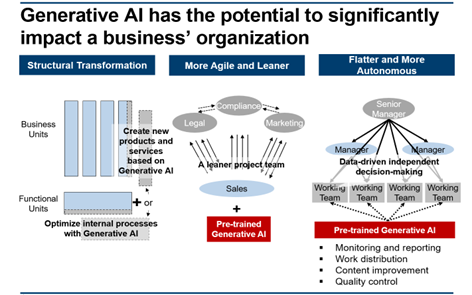
Source: Gao Feng Analysis
Opportunities and Challenges Brought by Generative AI
AIGC is driving major changes in traditional industries, leading to shifts in corporate structures that make businesses more agile, flexible, and autonomous. This evolution not only speeds up operations and fosters innovation but also makes decision-making faster. However, the broad adoption of AIGC comes with its share of risks and ethical challenges, like data privacy issues, copyright problems, recognition biases, and the impact on employment. These concerns require thorough discussions and effective regulation by businesses, policymakers, and the wider community to ensure that tech advancements align with social ethics and legal norms.
In this regard, China's "Interim Measures for the Management of Generative Artificial Intelligence Services," introduced in July 2023, marks the world's first detailed national regulation on AI. This move puts China at the forefront of global AI governance and offers valuable insights for other nations crafting similar regulations. These guidelines help ensure that businesses and developers use AIGC technology safely and ethically, aligning tech development with legal standards and advancing AI technology towards a better future.
Acknowledgement: Thanks to our Consultant William Yao for providing support in writing this article.
About the Authors
Edward Tse, founder and CEO of Gao Feng Advisory Company. He became one of the pioneers in China’s management consulting industry by building and running the Greater China operations of two leading international management consulting firms (BCG and Booz) for a period of 20 years. He has been a consultant to hundreds of companies, investors, start-ups, and public-sector organizations (both headquartered in and outside of China) on all critical aspects of business in China and China for the world. He has also advised the Chinese government organizations at different levels on strategies, state-owned enterprise reform and Chinese companies going overseas, as well as the World Bank and the Asian Development Bank. He is the author of several hundred articles and six books, including The China Strategy (2010), China’s Disruptors (2015) and《变局思维》 (Strategic Thinking in the Era of Mega Changes) (2022).
Christina Cen, Director at Gao Feng Advisory Company. With over 15 years of experience in providing consulting services to both domestic and international clients, her expertise spans strategy development, mergers and acquisitions, digital transformation, and organizational structure. Her clients come from various industries, including consumer retail, automotive, internet, and industrial products. Additionally, Ms. Cen has led strategic teams and projects in several consumer retail companies and has entrepreneurial experience in the Internet and AI sectors.
Rachel Hu, Manager at Gao Feng Advisory Company. She has worked in consulting and private equity across China, Australia, and Latin America. Rachel focuses on helping multinational clients expand, innovate, and succeed in China by designing efficient business models. She has collaborated with clients in various sectors such as technology, mobile internet, semiconductors, healthcare, and industrial technology.
Zoey Zhang, Senior Consultant at Gao Feng Advisory Company. She has extensive experience providing consulting services to multinational and local clients in both China and the United States. Her areas of expertise include finance, automotive, semiconductors, industrial, and technology. Zoey specializes in market entry strategies, tailored strategic planning, and business model design.
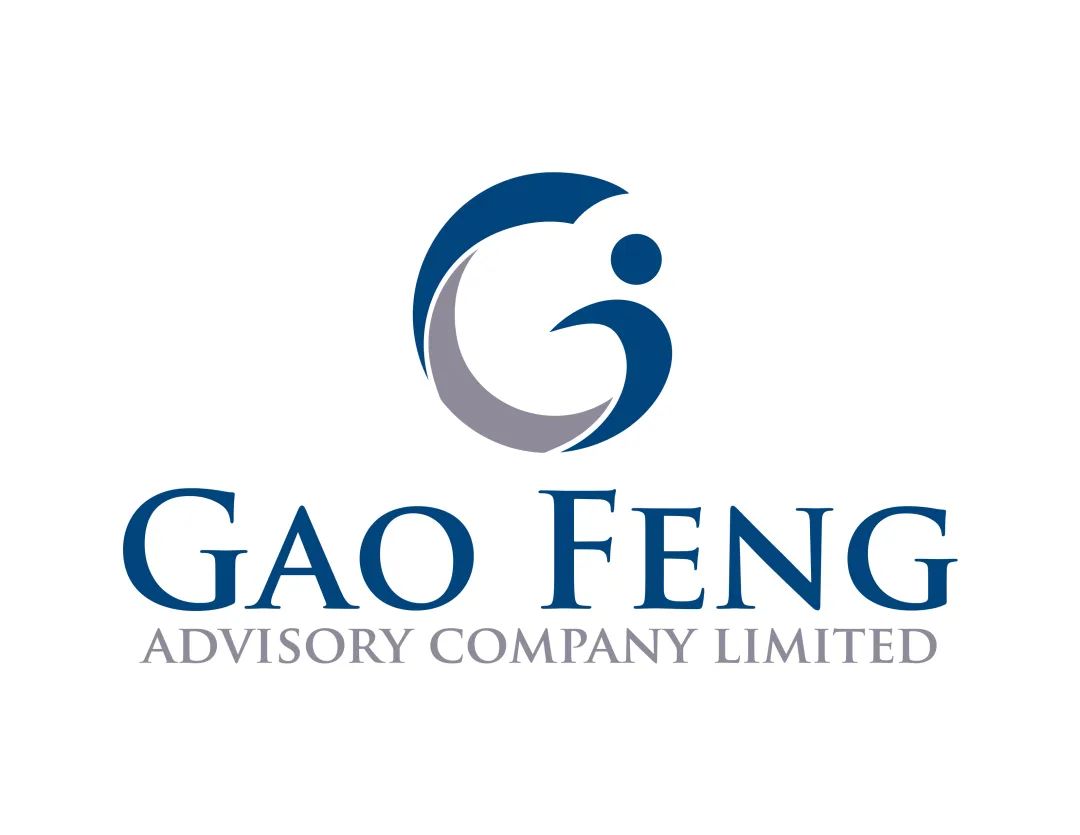
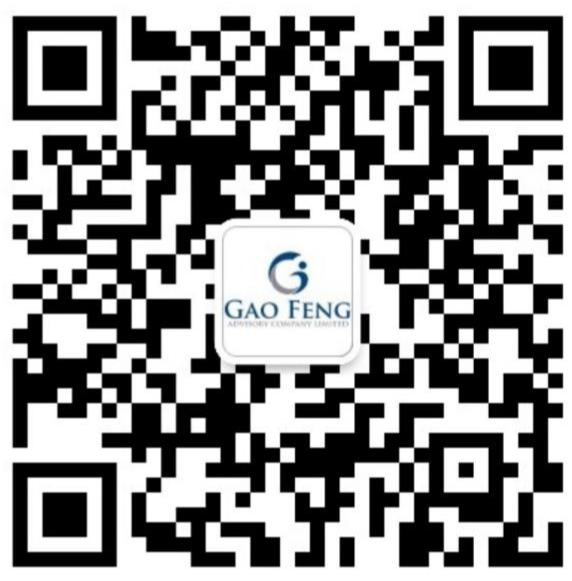
Gao Feng Advisory
Gao Feng Advisory Company is a professional strategy and management consulting as well as investment advisory firm with roots in China coupled with global vision, capabilities, and a broad resources network
Wechat Official Account:Gaofengadv
Shanghai Office
Tel: +86 021-63339611
Fax: +86 021-63267808
Hong Kong Office
Tel: +852 39598856
Fax: +852 25883499
Beijing Office
Tel: +86 010-84418422
Fax: +86 010-84418423
E-Mail: info@gaofengadv.com
Website: www.gaofengadv.com
Weibo: 高风咨询公司
